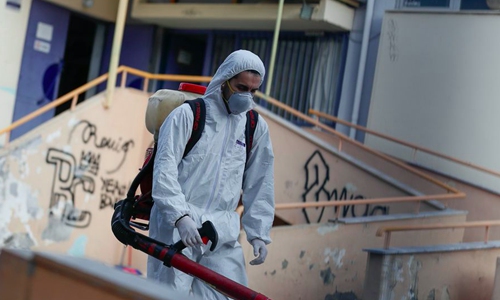HOME >> WORLD
Greece announces first set of economic measures for coronavirus, as confirmed cases reach 84
Source:Xinhua Published: 2020/3/10 8:34:19

A man wearing a protective suit decontaminates a primary school where a child was diagnosed with coronavirus in Thessaloniki, Greece, Feb. 27, 2020.(Photo by Dimitris Tosidis/Xinhua)
Greek officials announced on Monday the first set of economic measures to counter the novel coronavirus effects, as the number of confirmed cases in the country reached 84, according to the latest count.
The package includes additional expenditure for the health system and the suspension of VAT and social security contributions for four months in order to support businesses and regions, where the state introduces freezing of economic activity for more than 10 days, Greek Finance Minister Christos Staikouras told a press briefing.
"The coronavirus impact on global, European and national level has important negative repercussions, first on public health, and subsequently in the economy. What is needed is that we all stay calm, on alert and have foresight," the minister said, noting that the issue will be put on the table in the upcoming Eurogroup meeting next week.
"We will facilitate employees and businesses to adopt plans of gradual arrival at work to avoid big crowds in mass transportation and work spaces. We are supporting businesses to deal with the possible absence of employees due to preventive measures or when they need to take care of children staying at home when schools are closing," Minister of Labor and Social Affairs Ioannis Vroutsis added.
Dozens of schools have been shut since last week nationwide as part of precautionary measures to contain the further spread of the virus.
"The phenomenon we are facing is temporary, but there is much uncertainty. We do not know for sure when it will end. We need to support our industries and employment. We will be monitoring the developments according to sector and region and we will be taking measures," Theodoros Skylakakis, Greek deputy minister of finance for fiscal policy, noted.
The Greek officials did not give data on the impact on Greek economy so far, but Vassilis Korkidis, president of Piraeus Chamber of Commerce and Industry, in an e-mailed press release on Monday said that so far Greek economy has suffered losses of about 600 million euros (690 million US dollars).
Greek economy needs an antidote to avert bankruptcies of companies in sectors such as trade, transportations, as well as shipping and tourism, its two traditionally strong pillars, Korkidis stressed.
Under a basic scenario Greek GDP may shrink by 0.9 percent in 2020 and Greece will not achieve initial targets set for growth this year, according to a first estimate of the possible impact of the virus epidemic on Greek economy given by the Hellenic Fiscal Council (HFC), an independent administrative authority, in a report last week.
According to HFC, Athens should expect instead of a 2.8 percent growth rate something close to 2.2 percent or 1.9 percent, depending on how the epidemic will develop.
HFC economists forecast that Greek economy may mostly suffer losses in tourism, transports and decline of private consumption in catering and recreational activities.
The spike in the number of confirmed cases across the country and emergency prevention measures, such as bans on excursions, conferences and restrictions in culture and sports events, which have been introduced on regional and national level since last week seems to be already affecting these sectors, local media, like news portal in.gr, reported.
Dozens of new cases emerged in the past few days, and 56 are members of a group of Greeks who had traveled to Israel and Egypt and their close contacts, according to the Health ministry.
Greece has 11 new coronavirus infections since Sunday, raising the number of cases to 84, the Greek Health Ministry announced on Monday in an e-mailed press statement.
With the announcement of the new cases the Health ministry's commission of experts called on the elderly and people suffering of chronic diseases to avoid any unnecessary travels and gatherings, according to the press release.
In addition, the experts proposed teleconferences instead of business gatherings of more than 50 people when possible and the suspension of all cultural and sports events nationwide when more than 1,000 people are expected. (1 euro= 1.15 US dollars)
Posted in: EUROPE